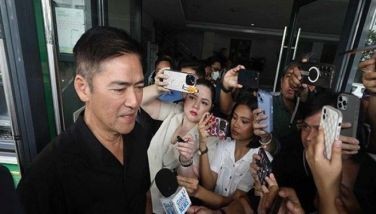Daddy’s little girl
January 15, 2007 | 12:00am
 Eighteen years after heading to Manila on the strength of an AB English degree and few other black-letter credentials, a young Davaoeño was making it big. In 1984, at 36 years old, Amado Lacuesta Jr. was general partner and general manager at the Multinational Investment Bancorporation, one of the premier investment houses of its day, and had been for the last 10 years. A self-confessed "last-minute dropout" from the Master of Business Management program at the Asian Institute of Management, he built for his family a sprawling suburban home, close to the prestigious private school where his young sons were in the honors sections. He brought home his newborn daughter in a pristine white Mercedes Benz – appropriate enough for a bright, dashing, jet-setting young executive making six figures a month.
Eighteen years after heading to Manila on the strength of an AB English degree and few other black-letter credentials, a young Davaoeño was making it big. In 1984, at 36 years old, Amado Lacuesta Jr. was general partner and general manager at the Multinational Investment Bancorporation, one of the premier investment houses of its day, and had been for the last 10 years. A self-confessed "last-minute dropout" from the Master of Business Management program at the Asian Institute of Management, he built for his family a sprawling suburban home, close to the prestigious private school where his young sons were in the honors sections. He brought home his newborn daughter in a pristine white Mercedes Benz – appropriate enough for a bright, dashing, jet-setting young executive making six figures a month.
In 1984, Working Girls, a so-called "serious sex comedy" directed by Ishmael Bernal and written by Amado Lacuesta Jr., was shown in theaters. Not long afterward, the promising young executive resigned from his position, gave up his stable six-figure salary and his Benz – which did manage to get a cameo appearance in the critically-acclaimed movie – and became a screenwriter. Over the next 11 years, he worked himself to the bone producing scripts, songs, and other materials for various films and TV shows, earning what was a pittance compared to his earlier salary – when his work sold, and if he got paid at all. He hobnobbed with famous directors and actors, stayed up late at shootings, and wrote plays and fiction on the side.

It’s easy to romanticize such a career shift: a banker suddenly turned bohemian, going from money market trading to moviemaking. But the questions he left in his wake are real. Why did he go into banking in the first place? What made him change his mind when he did? How long did the decision take, and what considerations did he weigh? Did he ever regret his move? I may never know for sure, because my father died before I ever thought to ask him. It was New Year’s Day 1997, just two months shy of his 50th birthday, and half a year after my 13th.
There’s plenty of room for educated guesses, though. While gathering material for his film retrospective – on Jan. 23 and 24 at the UP Film Institute, with free admission for the public – that will mark his 10th death anniversary, I came across the debris of a life too unexpectedly ended, and a career I never really got to understand: his college yearbook, printed copies of his scripts and stories, plotlines and character sketches in his unintelligible handwriting, outlines of speeches at various events, sheet after sheet of negatives from his brief stint in the Camera Club. I have my own cherished memories as his little girl who supposedly saved her yawns – as one of his Palanca award-winning stories will haunt me forever – but my father the writer, dreamer and thinker is hardly known to me.
Perhaps his college years foreshadowed the decisions he would make some 20 years after. He graduated with an English degree, after all. He was simultaneously the editor-in-chief of both the yearbook and the student newspaper. He regularly won the Ateneo de Davao University writing contests; he was praised for his performance as the Common Man in the local production of Robert Bolt’s play A Man for All Seasons. It was only after college, as he would later say in one of his speeches before some forum or other, that he realized that success in the real world required things other than Shakespearean eloquence. Such as an MBM degree.
Apparently, he decided to go for success. And got it. And then – after 18 years of it – gave it up.
Among his papers are many handwritten notes: a story idea here, a common theme of the human experience there, questions and thoughts on Filipino society everywhere. They are scribbled on tell-tale Multinational stationery, with his name and position printed on the bottom of each page. Was my father musing about life and death when he should have been crunching numbers? I imagine him wrestling with existential dilemmas in between partnership meetings, and spending his coffee breaks dreaming up characters that figures like Marilou Diaz-Abaya and Butch Perez would ultimately bring to life.
His retirement from banking must have opened the floodgates, then. My father wrote about "working girls," making their own way through the Makati business world by their wits and wiles; he wrote about abortion, and how, in Maricel Soriano’s eyes, valuing life might not necessarily mean giving birth to it. He wrote about refrigerators raping Janice de Belen and about Catholic priests turning into rebel leaders. He went through books upon books about the Ifugao and spent weeks in the Banawe mountains to eventually present Raymart Santiago as a mumbaki, a tribal healer who opts out of a medical career in the US to serve his father’s people instead.
What his films didn’t portray, his work for TV and his other writings did. The consistently acclaimed TV satire Sic O’Clock News brought the follies of Philippine politics to the people who needed to understand and laugh at it the most. In his plays and short stories, he challenged conventional ideas and exposed religious hypocrisy. His account of the EDSA Revolution in 1986, widely excerpted in the book People Power, told of a fierce personal patriotism gloriously mirrored across the various social divides over those four historic February days. In his speeches and interviews he insisted on truth, rather than what he called propaganda, as his own commitment as a screenwriter, and on entertainment being not incompatible with enlightenment when it came to show business.
My mother tells of a conversation they had only some days before he died. She was scolding him for "burning the candle at both ends" – staying up too late, getting up too early, and working harder than was, as it turned out, good for him. He retorted: "Maybe so, but it’s a candle that’s blazing brightly!"
In stories about adopted or orphaned persons, they’re usually obsessed with finding, or finding out about, their birth parents. What were they like? What did they do? Have their children taken after them – and is that a good thing? It’s a commonly used – and abused – theme, but somehow it never gets old. Maybe because knowing where we came from helps us figure out where we want to go. Maybe knowing who gave life to us helps us understand who we are. And these questions, these challenges, never get old.
My father ultimately went back to banking, two and a half years before his death. Why he did so, I’m not sure either. But certainly the possible reasons for his return – as well as for his departure over a decade before – continue to tease me. I graduated from college a few years ago, and, like him, have gone on to further studies for a prestigious and lucrative career. Like him, I am continually fascinated by ideas, theories, philosophies, the themes of human experience. But, like him, and no doubt like many a young newcomer to the workforce, I would like to be successful in the "real world." I know I wouldn’t mind a Mercedes Benz in my garage, anyhow.
My father perhaps did burn the candle too recklessly. But he left me and my brothers a vivid impression of happiness doggedly pursued, success constantly questioned and redefined. Facing now the decisions that every graduate must make, I want to understand why my father made the choices he did and whether, in the end, he got what he had always dreamed of. I want to know if he made mistakes I might repeat or had regrets I might inherit; if I can reconcile real-world success with lasting personal fulfillment. I want some reassurance that when I die, I, too, will be able to say that my own candle burned brightly in its time.
But, for now, all I have to go on are the papers and awards he left behind. And if you’ll excuse me, I have some movies I need to see.
(From Jan. 23 to 24, there will be a special retrospective of the film work of Amado Lacuesta Jr. at The UP Film Institute Cine Adarna (UP Film Center), on Magsaysay Road at the UP Diliman Campus. The public is invited to screenings of the following: Working Girls (1984, directed by Ishmael Bernal) at 7 p.m. on Jan. 23; Segurista (1996, co-written with Jose Lacaba and directed by Tikoy Aguiluz) at 2 p.m. on Jan. 24, Balweg: The Rebel Priest (directed by Butch Perez) at 5 p.m. on Jan. 24, and Mumbaki (directed by Butch Perez) at 7 p.m. on Jan. 24. Admission is free.)
BrandSpace Articles
<
>
- Latest
- Trending
Trending
Latest
Trending
Latest
Recommended


































